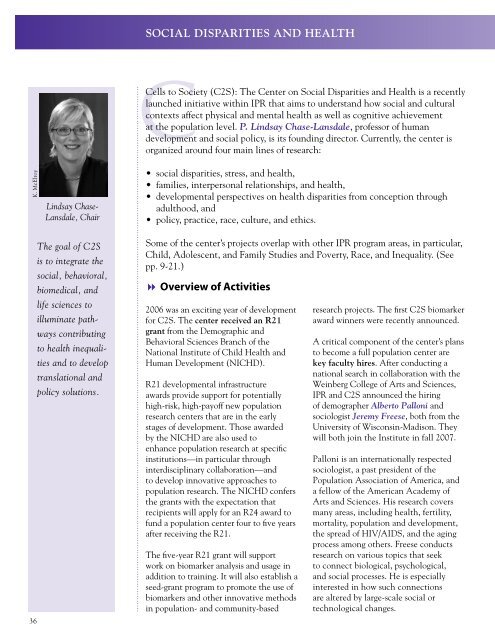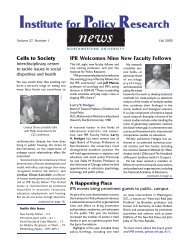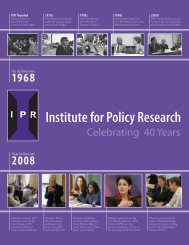pdf - Institute for Policy Research - Northwestern University
pdf - Institute for Policy Research - Northwestern University
pdf - Institute for Policy Research - Northwestern University
Create successful ePaper yourself
Turn your PDF publications into a flip-book with our unique Google optimized e-Paper software.
K. McElroy<br />
Social disparities and health<br />
Cells to Society (C2S): The Center on Social Disparities and Health is a recently<br />
launched initiative within IPR that aims to understand how social and cultural<br />
contexts affect physical and mental health as well as cognitive achievement<br />
at the population level. P. Lindsay Chase-Lansdale, professor of human<br />
development and social policy, is its founding director. Currently, the center is<br />
organized around four main lines of research:<br />
Lindsay Chase-<br />
Lansdale, Chair<br />
• social disparities, stress, and health,<br />
• families, interpersonal relationships, and health,<br />
• developmental perspectives on health disparities from conception through<br />
adulthood, and<br />
• policy, practice, race, culture, and ethics.<br />
36<br />
The goal of C2S<br />
is to integrate the<br />
social, behavioral,<br />
biomedical, and<br />
life sciences to<br />
illuminate pathways<br />
contributing<br />
to health inequalities<br />
and to develop<br />
translational and<br />
policy solutions.<br />
Some of the center’s projects overlap with other IPR program areas, in particular,<br />
Child, Adolescent, and Family Studies and Poverty, Race, and Inequality. (See<br />
pp. 9-21.)<br />
8 Overview of Activities<br />
2006 was an exciting year of development<br />
<strong>for</strong> C2S. The center received an R21<br />
grant from the Demographic and<br />
Behavioral Sciences Branch of the<br />
National <strong>Institute</strong> of Child Health and<br />
Human Development (NICHD).<br />
R21 developmental infrastructure<br />
awards provide support <strong>for</strong> potentially<br />
high-risk, high-payoff new population<br />
research centers that are in the early<br />
stages of development. Those awarded<br />
by the NICHD are also used to<br />
enhance population research at specific<br />
institutions—in particular through<br />
interdisciplinary collaboration—and<br />
to develop innovative approaches to<br />
population research. The NICHD confers<br />
the grants with the expectation that<br />
recipients will apply <strong>for</strong> an R24 award to<br />
fund a population center four to five years<br />
after receiving the R21.<br />
The five-year R21 grant will support<br />
work on biomarker analysis and usage in<br />
addition to training. It will also establish a<br />
seed-grant program to promote the use of<br />
biomarkers and other innovative methods<br />
in population- and community-based<br />
research projects. The first C2S biomarker<br />
award winners were recently announced.<br />
A critical component of the center’s plans<br />
to become a full population center are<br />
key faculty hires. After conducting a<br />
national search in collaboration with the<br />
Weinberg College of Arts and Sciences,<br />
IPR and C2S announced the hiring<br />
of demographer Alberto Palloni and<br />
sociologist Jeremy Freese, both from the<br />
<strong>University</strong> of Wisconsin-Madison. They<br />
will both join the <strong>Institute</strong> in fall 2007.<br />
Palloni is an internationally respected<br />
sociologist, a past president of the<br />
Population Association of America, and<br />
a fellow of the American Academy of<br />
Arts and Sciences. His research covers<br />
many areas, including health, fertility,<br />
mortality, population and development,<br />
the spread of HIV/AIDS, and the aging<br />
process among others. Freese conducts<br />
research on various topics that seek<br />
to connect biological, psychological,<br />
and social processes. He is especially<br />
interested in how such connections<br />
are altered by large-scale social or<br />
technological changes.
















